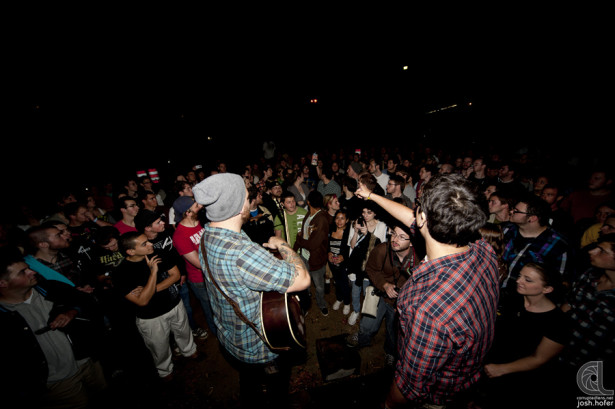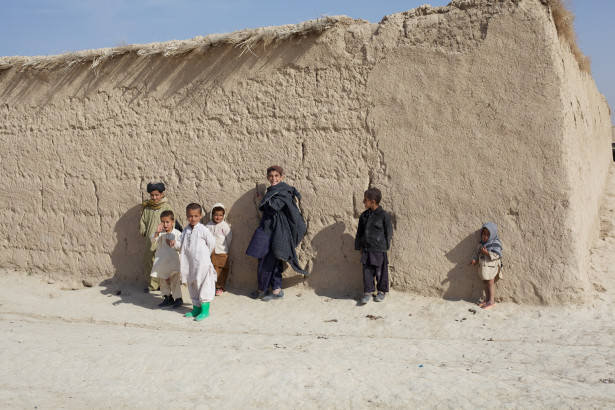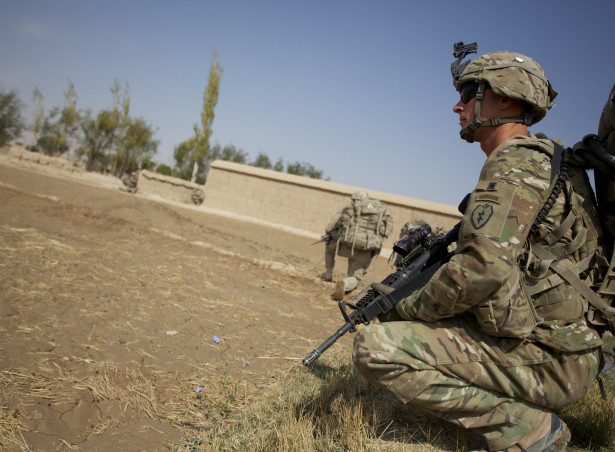Joshua Causie’s story is pretty amazing. Since originally stumbling upon Invisible Children, his journey has taken him through military service in Afghanistan and taught him to live for others. Today, he is one of our biggest supporters. But we’ll let him tell you the rest.
//
I first heard about Invisible Children at a concert several years ago. I wrote ‘heard about’ but I should have written ‘glanced at’ because, having absolutely no idea why they had a table set up next to the merch and being keenly interested in sweet T-shirts, my attention strayed pretty quickly. Thankfully they get around. I saw them again when Thrice played with Brand New a few years later and actually took the time to stop by their table to find out why there was a picture of a little guy wearing a helmet.

Thrice concert
The lasting impression that the conversation had was not immediately evident since I was generally content with helping those in my immediate proximity. Despite my Christian faith, I was deeply involved with my own life and didn’t think that I really had the money or time to spare for much outside of me. So things continued relatively uninterrupted; I graduated from college, was commissioned as an Army Officer and stationed in Fairbanks, Alaska.
It actually wasn’t until a few years after that initial encounter, when I was walking around in Afghanistan, that the work done by Invisible Children started to really hit home. While there, I very clearly saw the ways a war can impact a civilian populace, especially one labeled ‘human terrain’ and considered a key component to winning in Afghanistan. We weren’t there for the goodness inherent in humanitarian aid; instead we prioritized improving their quality of life as a means of achieving a larger goal: winning them to the side of the Afghan Government over the Taliban.

This is not lost on Afghans and their responses to the situation vary by their position within the system. On the one hand, I witnessed the corruption and selfishness of some members in local military units and the provincial government. On the other, I met a fair number of adults who were too jaded or set in their ways to think about investing in anything other than their own families and homes. It wasn’t that they didn’t care about improving their situation; they were just scarred by the uncertainty of living from one day to the next in a conflict.
It’s too dramatic to say that the current generation couldn’t see a future, but the outlook of their children was far sunnier. You could ask kids in the street what they wanted to be when they grew up and they’d tell you that they wanted to be doctors, teachers and engineers. They were ecstatic when it was time to go to school and regardless of their parents’ shortcomings, they usually allowed the children to attend.
Nowhere is it more evident that children are the keys to changing things for the better than in an impoverished, war torn nation. When you’re on the ground in a place like that, it’s easy to see that children can learn to think and behave differently with less effort than the ones who came before them if they’re given the chance.
The preservation of that innocence and potential is a huge part of why Invisible Children was initially founded. A very special group of young people saw a war that didn’t just destroy the present generation but robbed a people of their entire future by forcing children to fight.
Does robbing the future sound like a stretch? Consider the implications of a generation growing up to understand that if you’re strong, fast and armed, you can just take anything you want. Then remove healthy parental influences, formal education, and add a massive devaluation of human life. To say that things would get messy would be an understatement.
So why Invisible Children rather than another non-profit organization (NPO) working toward similar goals? The short answer is that I trust them to put the donations I provide to good use. As a Christian, I’m called to love my fellow human beings the same way that God loves me and while there are many times when this seems like less of a calling and more of a challenge, I’m working on it. (What has two thumbs and isn’t perfect…) Invisible Children seems to have it pretty well figured out though. I don’t know of another NPO operating as effectively and with as much dedication, love and concern for the huge number of people that it’s reaching than Invisible Children.
Not to make light of a serious situation but when was the last time that a prominent member of a NPO had a nervous breakdown because they thought they weren’t going to be able to help people anymore? And how many organizations can you think of that so clearly see the humanity embroiled in a conflict that they have programs dedicated to extracting and rehabilitating those perpetrating acts of violence? How many are able to balance the critical, short-term assistance with long-term projects that deliver returns over the course of several years?
I’m impressed that Invisible Children began as a grass-roots organization with few plans outside of raising awareness but then managed to transition into one that is seeking and implementing innovative solutions to problems they encounter on the ground. I love that they don’t just provide temporary solutions for those problems either — they consider the second and third order effects of their actions and work to leave behind something that can be operated and sustained by those it is intended to help. It’s incredible to see the strides they’ve made over the course of a few years. Those strides are indicative of Invisible Children’s ability to responsibly manage the money that they receive and the incredible passion for the human beings that they want to impact.
Hopefully none of this sounded contrived. I really do feel led to give based on my experiences and my faith. I really do believe that Invisible Children is an incredibly loving and effective organization worth supporting. I also really believe that if you’re reading this and haven’t found ways to live out your principles and beliefs, you absolutely should.
//


Think people should hear about this?